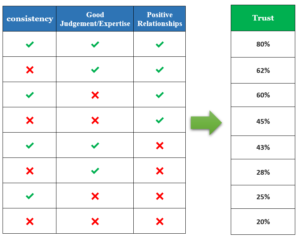
Leaders want to be trusted by those they lead, in our coaching with leaders, we often see that trust as a leading indicator of evaluating others is more important when it comes to leaders and affects other aspects of leadership.
But creating that trust or, perhaps more importantly, reestablishing it when you’ve lost it isn’t always that straightforward.
Fortunately, by looking at data from the 360 assessments of 87,000 leaders, we were able to identify three key clusters of items that are often the foundation for trust. We looked for correlations between the trust rating and all other items in the assessment and after selecting the 15 highest correlations, we performed a factor analysis that revealed these three elements. Further analysis showed that the majority of the variability in trust ratings could be explained by these three elements.
By understanding the behaviors that underlie trust, leaders are better able to elevate the level of trust that others feel toward them. Here are the three elements.
Positive Relationships. Trust is in part based on the extent to which a leader is able to create positive relationships with other people and groups. To instill trust a leader must:
- Stay in touch on the issues and concerns of others.
- Generate cooperation between others.
- Resolve conflict with others.
- Give honest feedback in a helpful way
Good Judgement/Expertise. Another factor in whether people trust a leader is the extent to which a leader is well-informed and knowledgeable. They must understand the technical aspects of the work as well as have a depth of experience. This means:
- They use good judgement when making decisions.
- Others trust their ideas and opinions.
- Their knowledge and expertise make an important contribution to achieving results.
- Can anticipate and respond quickly to problems.
Consistency. The final element of trust is the extent to which leaders walk their talk and do what they say they will do. People rate a leader high in trust if they:
- Are a role model and set a good example.
- Walk the talk.
- Honor commitments and keep promises.
- Are willing to go above and beyond what needs to be done.
We wanted to understand how these three elements interacted to create the likelihood that people would trust a leader. We created three indices for each element and since we had such a large dataset, we experimented with how performance on each of the dimensions impacted the overall trust score. In our study we found that if a leader scored at or above the 60th percentile on all three factors, their overall trust score was at the 80th percentile. We compared high scores (above 60th percentile) and low scores (below the 40th percentile) to examine the impact these had on the three elements that enabled trust. Note that these levels are not extremely high or low. Basically, they are 10 percentile points above and below the norm. This is important because it means that being just above average on these skills can have a profound positive effect and, conversely, just being below average can destroy trust.
We also found that level of trust is highly correlated with how people rate a leader’s overall leadership effectiveness.
Do You Need All Three Elements of Trust?
We were also curious to know if leaders needed to be skilled in all three elements to generate a high level of trust and whether any one element had the most significant impact on the trust rating. To gauge this, we created an experiment where we separated leaders into high and low levels on each of the three pillars and then measured the level of trust.
Intuitively we thought that consistency would be the most important element. Saying one thing and doing another seems like it would hurt trust the most. While our analysis showed that inconsistency does have a negative impact (trust went down 17 points), it was relationships that had the most substantial impact. When relationships were low and both judgment and consistency were high, trust went down 33 points. This may be because many leaders are seen as occasionally inconsistent. But once a relationship is damaged or if it was never formed in the first place, it’s difficult for people to trust.
One element of trust is more important than the others. Relationships seems to matter more than judgment or consistency.
The table below is the result of a review of 360 evaluations of 87,000 leaders which shows that trust is higher when there is only good relationships than when there is judgment and consistency together.

We often tell people that they don’t need to be perfect to be an excellent leader, but when it comes to trust, all three of these elements need to be above average. Remember that, in our analysis, we set the bar fairly low: at the 60th percentile. This is not a brilliant level of performance, barely above average.
by Jack Zenger and Joseph Folkman; Harvard business review, August/ 24/ 2018, Summarized by Ahmadreza Ahrarnejad



